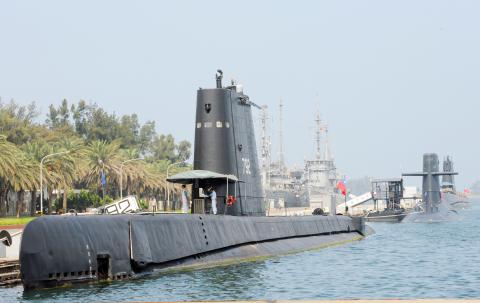The Ministry of National Defense yesterday unveiled a 15-year plan to modernize the Republic of China (ROC) Navy, focusing on domestic shipbuilding with a budget of about NT$200 billion (US$6.2 billion), while a research committee is to assess a program to develop a submarine fleet.
Minister of National Defense Feng Shih-kuan (馮世寬) presented the plan alongside top navy officials ,which he said would provide the needed warships and weapons to defend the nation and its maritime territories in a conflict situation and would also spur growth and elevate the nation’s technological capacity in defense.
A NT$196 billion budget has been allocated for the domestic shipbuilding program, which is to go toward the construction of 138 warships, missile cruisers, fast-attack boats and other vessels, according to a report submitted by Feng at a meeting of the legislature’s Foreign Affairs and National Defense Committee.

Photo: Chang Chung-i, Taipei Times
According to the report, most of the construction of the 138 vessels has been completed, with many undergoing sea trials and testing of their operations and weaponry systems.
The vessels were contracted to China Shipbuilding Corp (CSBC), Jong Shyn Shipbuilding and Ching Fu Shipbuilding, all based at Kaohsiung Port, along with Lung Teh Shipbuilding, which has its shipyard in Yilan County.
Another NT$60 billion has been allocated to start construction next year of unspecified numbers of amphibious transport vessels, mine-layer boats, mine-hunting ships and Tuo Jiang-class guided missile corvettes, Feng said.
The ministry is also to commission the state-enterprise Ship and Ocean Industries Research and Development Center to undertake research and feasibility studies on developing a national submarine manufacturing program, with a budget of NT$30 million.
Naval officials said that diesel engines and electrical supply systems for submarines would need to be procured from overseas.
Feng also told lawmakers that the military would make every effort to bolster personnel training and improve military discipline.
Feng, said that he has given a directive that the military review its personnel training procedures within 45 days and work to improve them.
Chief of General Staff general Yen De-fa (嚴德發) is to then inspect each military unit, he added.
Additional Reporting by CNA

CALL FOR SUPPORT: President William Lai called on lawmakers across party lines to ensure the livelihood of Taiwanese and that national security is protected President William Lai (賴清德) yesterday called for bipartisan support for Taiwan’s investment in self-defense capabilities at the christening and launch of two coast guard vessels at CSBC Corp, Taiwan’s (台灣國際造船) shipyard in Kaohsiung. The Taipei (台北) is the fourth and final ship of the Chiayi-class offshore patrol vessels, and the Siraya (西拉雅) is the Coast Guard Administration’s (CGA) first-ever ocean patrol vessel, the government said. The Taipei is the fourth and final ship of the Chiayi-class offshore patrol vessels with a displacement of about 4,000 tonnes, Lai said. This ship class was ordered as a result of former president Tsai Ing-wen’s (蔡英文) 2018

UKRAINE, NVIDIA: The US leader said the subject of Russia’s war had come up ‘very strongly,’ while Jenson Huang was hoping that the conversation was good Chinese President Xi Jinping (習近平) and US President Donald Trump had differing takes following their meeting in Busan, South Korea, yesterday. Xi said that the two sides should complete follow-up work as soon as possible to deliver tangible results that would provide “peace of mind” to China, the US and the rest of the world, while Trump hailed the “great success” of the talks. The two discussed trade, including a deal to reduce tariffs slapped on China for its role in the fentanyl trade, as well as cooperation in ending the war in Ukraine, among other issues, but they did not mention

HOTEL HIRING: An official said that hoteliers could begin hiring migrant workers next year, but must adhere to a rule requiring a NT$2,000 salary hike for Taiwanese The government is to allow the hospitality industry to recruit mid-level migrant workers for housekeeping and three other lines of work after the Executive Yuan yesterday approved a proposal by the Ministry of Labor. A shortage of workers at hotels and accommodation facilities was discussed at a meeting of the legislature’s Transportation Committee. A 2023 survey conducted by the Tourism Administration found that Taiwan’s lodging industry was short of about 6,600 housekeeping and cleaning workers, the agency said in a report to the committee. The shortage of workers in the industry is being studied, the report said. Hotel and Lodging Division Deputy Director Cheng

‘SECRETS’: While saying China would not attack during his presidency, Donald Trump declined to say how Washington would respond if Beijing were to take military action US President Donald Trump said that China would not take military action against Taiwan while he is president, as the Chinese leaders “know the consequences.” Trump made the statement during an interview on CBS’ 60 Minutes program that aired on Sunday, a few days after his meeting with Chinese President Xi Jinping (習近平) in South Korea. “He [Xi] has openly said, and his people have openly said at meetings, ‘we would never do anything while President Trump is president,’ because they know the consequences,” Trump said in the interview. However, he repeatedly declined to say exactly how Washington would respond in